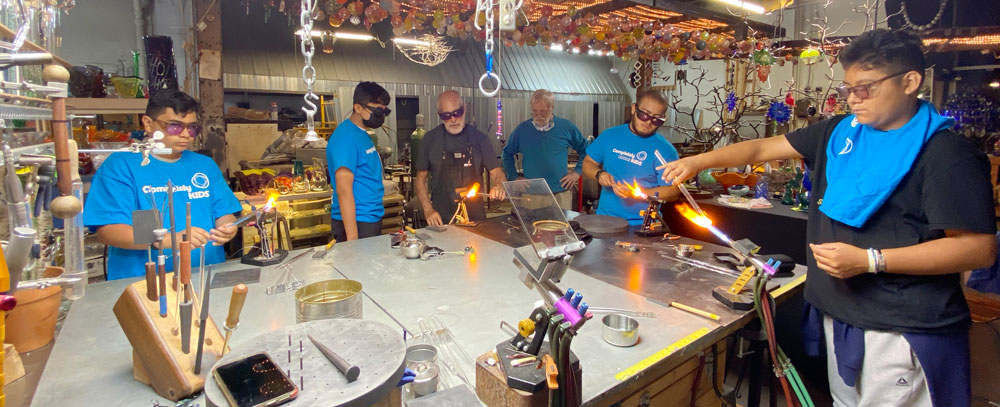“It’s just kind of interesting that your paths cross as you wander the world looking for things.” – Ed Fennell, artist-owner, Crystal Forge
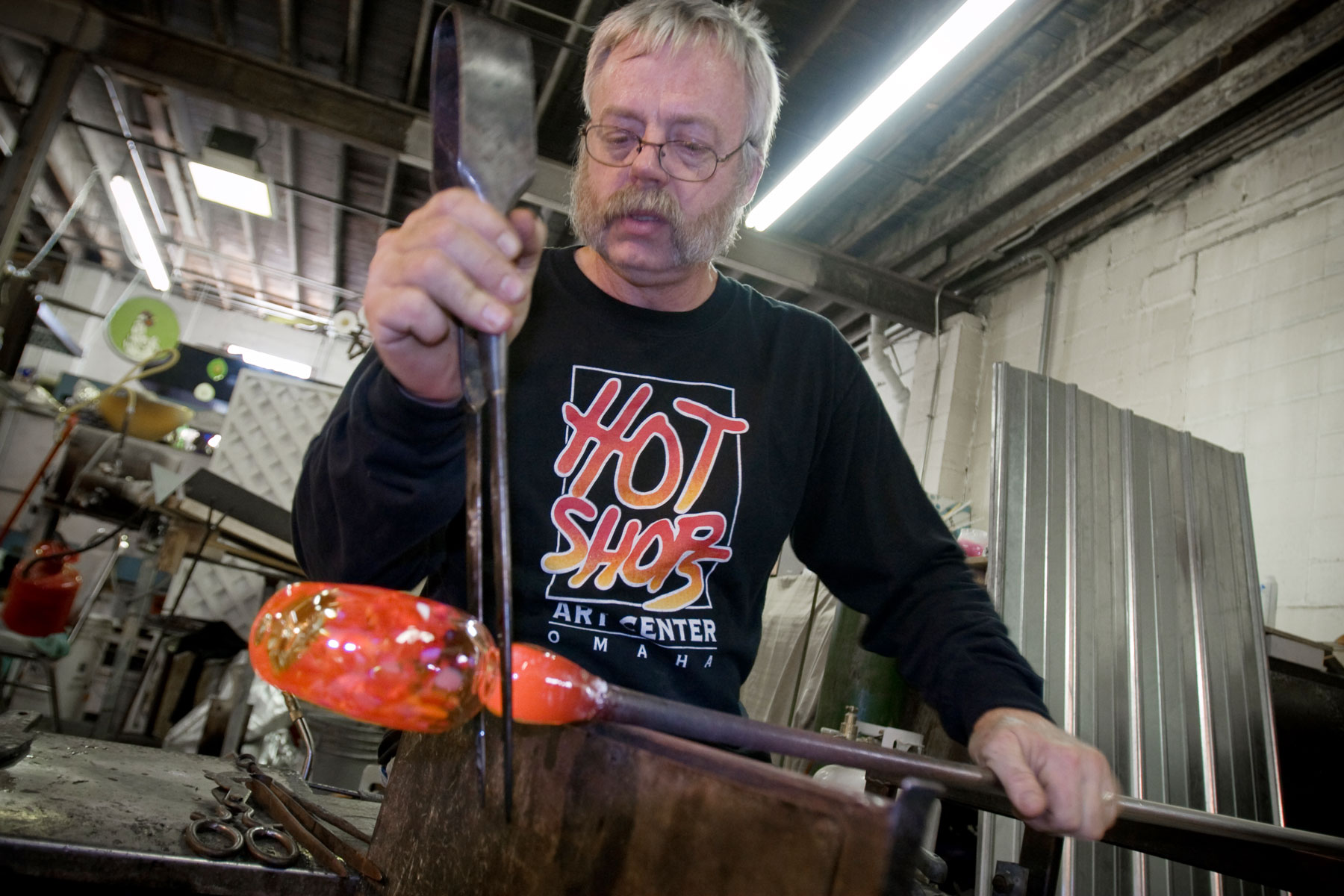
Ed Fennell is a master at forging – connections. Long-lasting, highly-impactful connections. Attached to each is a story (or several) that helps explain how an artist came to live his passion in Omaha and ultimately at the iconic art center that he helped found – Hot Shops Art Center.
Inside Ed’s studio, Crystal Forge, you’ll find him teasing hot, molten glass into beautiful works of art. He was a senior in college when he first became intrigued by the craft of glassblowing.
“I had no chance to stay and do anything with it. I just promised myself I would try it if I ever got the opportunity,” Ed says.
A few years later, the opportunity arose. After getting involved with the Nebraska Crafts Council, Ed met renowned sculptor and glassblower Ray Schultze and made that first of many pivotal connections.
“I got to try glassblowing and I was hooked. But I had to figure out how to do it,” he says. “I hobnobbed around with other people and found Tony Curiel. He was blowing glass, but his furnace was down. So, I helped him rebuild it and get going again. I was surprised at how many people came out of the woodwork to blow glass in front of me after I helped build the furnace.”
As Ed honed his glassblowing skills, the father of then-young children found himself spending more and more time at Tony’s hot shop. He says he “decided to pull together my materials and build a furnace at home and so I could work there and have more time with the kids, Plus, they could help me and that was kind of fun.”
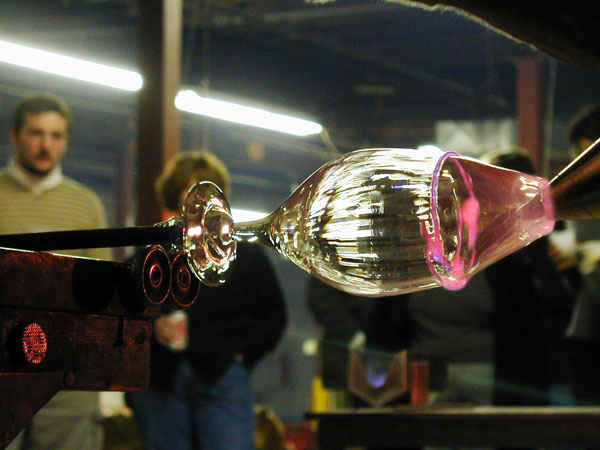
Back in the day, Ed and his wife, Rose, would hold open houses. They’d invite friends and co-workers over to have pizza and see some glassblowing.
“I was just busy making stuff. I didn’t care if it sold or not. People wanted to buy stuff and I said, ‘No, I’m not dealing with money at this party. It’s just a party. If you want it put your name on it, at the end of the day, we will talk about it.’ At the end of the day, there was a vase that had about eight people’s names on it. So, I had to make eight pieces that looked similar to it.”
Ed continued, “It was my working friends who wound up supporting me, pushing me, saying you need to do more of this to the point that some of them would say, when they’d see me late at work, ‘What are you doing here? You need to go and blow.’”
His scope began to expand. Ed started doing renaissance fairs, growing his open house parties and building clientele. He and an artist friend realized they were both too big for their respective garages so they moved to a space at the southwest edge of the Old Market.
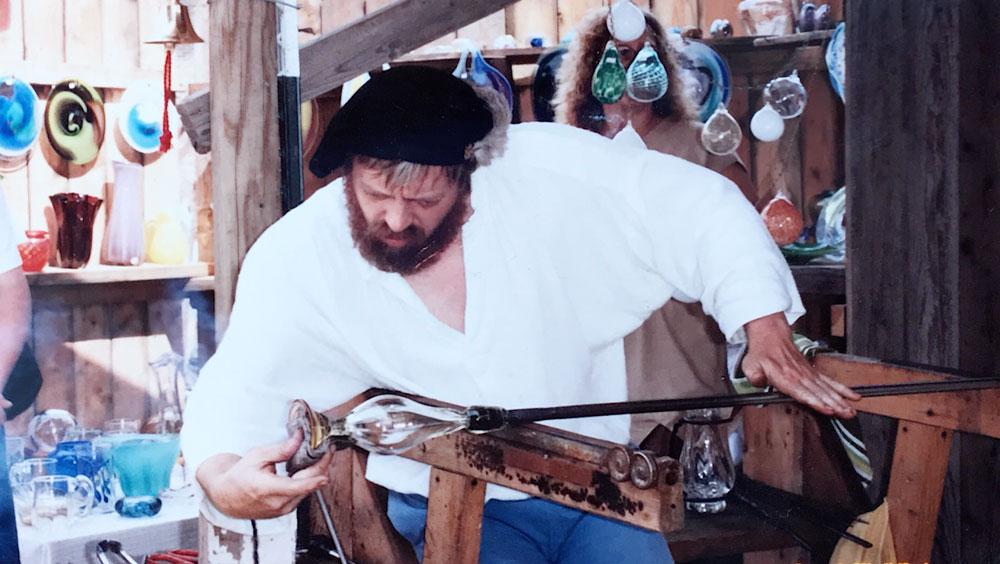
“And that made it escalate very quickly,” Ed says.
With that escalation came new connections.
“I worked with Ron Loken doing blacksmithing and glass in architectural settings. I worked with Tim Barry on projects he was doing and then worked with Les Bruning,” Ed says. “I was the person in the group, when we were thinking about doing the Hot Shops, that had worked with everyone else.”
With Ed as the common connection, the idea for a first-of-its-kind art center in Omaha began to take shape; a collaborative place where ideas, dreams and ‘what-ifs’ are created, explored and shared. In November 1999, the artists and a group of investors bought a former mattress factory and began transforming it into the Hot Shops.
“We knew we were going to go in debt. How much of debt depended on how quickly we could get it off the ground,” Ed says. “We started asking people and they said, ‘If you did something like that, I would be looking for a studio to do my painting in.’”
“One gentleman asked me, ‘What do you expect to get out of this?’ – because he was used to making his money make more money. And I said, ‘Well, if I get to drink a better brand of beer, it will be worth it.’ He looked at me all flushed in the face like ‘You’re kidding me.’ So, he comes the next day and says, ‘I got to thinking last night about what you said. I can’t think of a better reason to write a check.’”
Little did Ed and the other founders know – with investments coming in and the buildout underway – that the property they’d just closed on was about to become much more prime. In May of 2000, Omaha voters approved a $216 million bond issue to build a new convention center and arena about half-a-mile from the Hot Shops.
“So luckily, we had the property because we wouldn’t have been able to afford it now.”

But all was not assured. Shortly after the convention center vote, a verbal agreement for a loan cratered, leaving the founders scrambling for critical bank financing. A simple act of kindness at a rainy Renaissance Faire helped turn the Hot Shops fortunes around. Ed, who was blowing glass at the event, spotted the king and queen and offered them a warm, dry escape from the elements.
“As it turned out, he was the president of the bank (People’s Bank) that I did business with,” Ed says. “I called him on Wednesday. We met with him on Friday. By Monday, we had the loan.”
Ed continues, “I met up with him and his wife a couple years later at a renaissance dinner. They had asked me to come as an honored guest, so I dressed up in my tights and went. He was pretty excited, comes right across smiling, presented his hand and said, ‘Things are going great at the Hot Shops.’ I said, ‘Tom, what makes you say that?’ He said, ‘You never show up on my computer screen. That means you’ve always paid your note.’”
Today’s Hot Shops Art Center houses four core “Hot Shops” – a foundry, forge, ceramics and glass studio – as well as 80+ artist studios and multiple gallery spaces. It is seen as an anchor in a North Downtown that now includes Film Streams, Slowdown, TD Ameritrade Park, Tip-Top, and the Mastercraft Building.
“I think it is quite dramatic what the Hot Shops has done to this part of town,” Ed says.
Back when the venture was just starting up, Ed was the last to move in: “I was still working in my other shop down in the Old Market while I was building the studios for other people. My space was saved for me and I paid my rent every month like clockwork for more than 12 months to save this space.”
Ed’s Crystal Forge has been operating at the Hot Shops for 20 years now. The studio is located in the very southwest corner of the building and is open to the public throughout the year.
“When I was sitting milking cows by hand as a kid, I never dreamed that I’d be blowing glass and this stuff. I was way too shy for that, for what I’m doing now.”
In addition to creating at the Hot Shops, Ed is also passionate about educating.
“We’re about encouraging others and teaching. There are so many teaching moments in life. I’m still a student. I’m still a student of glass, a student of life in general,” Ed says. “I love Tim’s comment, ‘We all know what we like, but we only like what we know.’ So, education is a big portion of it. Education for ourselves, education to give other people.”
While Ed no longer teaches, classes are still held from those he has instructed in the past. The public can have a very basic experiential lesson, or, for those interested in pursuing it more seriously can attend a two-day workshop. Students learn the basics of glassblowing and develop their glass shaping skills.
“I tell my students I can be your guide but the glass has to be your teacher,” Ed says.
The workshops – and Ed’s positive approach to sharing his expertise – have been “sort of life-changing” for a number of his students, including Matthew Shrader, the artist behind Shrader Made Glass.
Matthew says a Dale Chihuly exhibit at Joslyn Art Museum in 2000 initially sparked his interest in glassblowing. He was a senior at Central High School at the time. About three years later, he converted interest into action and attended one of Ed’s weekend workshops at Crystal Forge.
“Right off the bat, he was super inviting and inclusive. I really got hooked from then on, and Ed was very supportive along the way,” says Matthew who creates most all of his Shrader Made Glass at Crystal Forge. “I never felt, with Ed, that there was a pressure like, “Oh, if I can’t do this, I don’t fit in.’ His openness was always key for me to feel like I could express myself and do my artwork. … His generosity is pretty unheard of.”
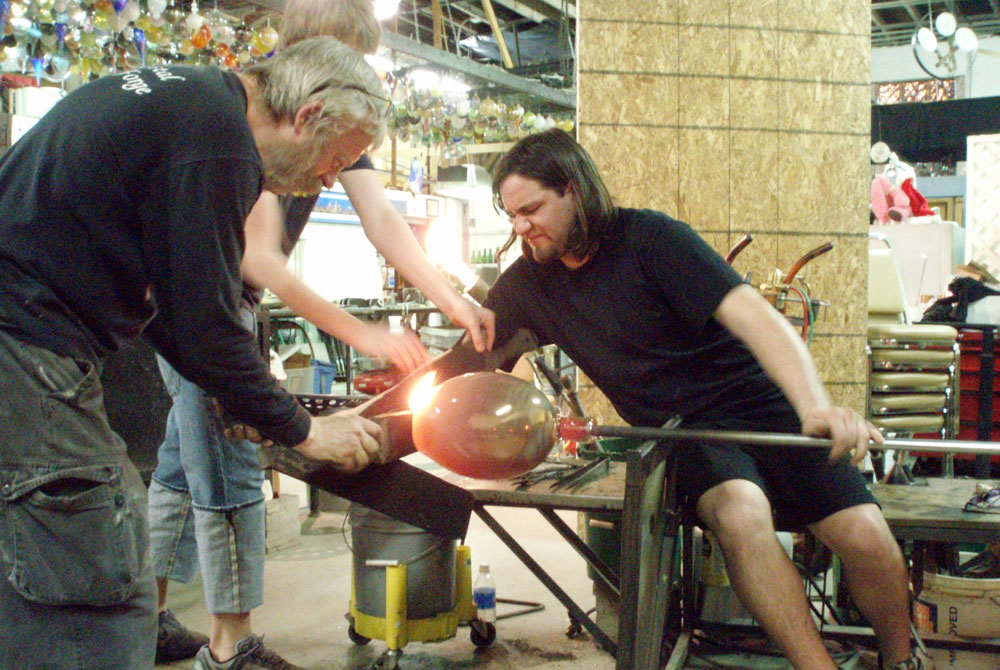
California-based glassblower Tyler Barry, son of Hot Shops founder Tim Barry, says he wouldn’t have “any of this knowledge or skill if I wouldn’t have grown up at the Hot Shops and if Ed hadn’t been so kind in showing me the ropes.”
Tyler’s introduction to glassblowing came at age 7 – his dad and Ed were collaborating on a baptismal font, which included a blown glass bowl.
“They let me help out on the making of it. … I was pretty much hooked at that point,” Tyler says. “I can remember always wanting to go to the glass studio anytime I had the opportunity. When I first started, I was too short to pull the glass out of the furnace, so I had to have someone help me with that.”
Tyler adds, “Ed was stoked that I was in there. He has a really big heart and loves to help people out. Anyone that is inspired, he gets so much joy out of teaching them. He is so open with his knowledge, always willing to brainstorm ideas and problem-solve.”
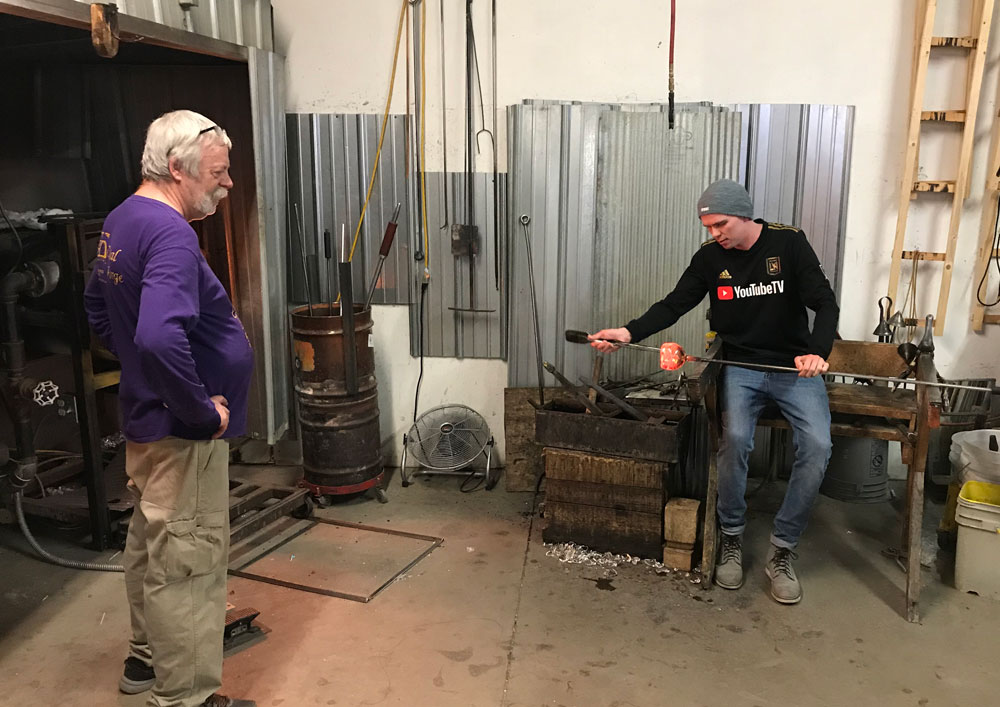
Now, exactly twenty years after the purchase of that old mattress factory, Ed is excited about the bold, next phase in the life of the Hot Shops – its pivotal transition into a nonprofit organization. The move will allow the center to expand its programming, upgrade its building and sustain its purpose well into the future.
“Now that the neighborhood is changing, I think it’s important, at this point in our history, to become a nonprofit so that future generations will get the benefit,” Ed says. “My hope is that my great-grandkids will get to be involved in one way or another with the Hot Shops. … It is a place where you can dream – and dreams turn into reality.”
